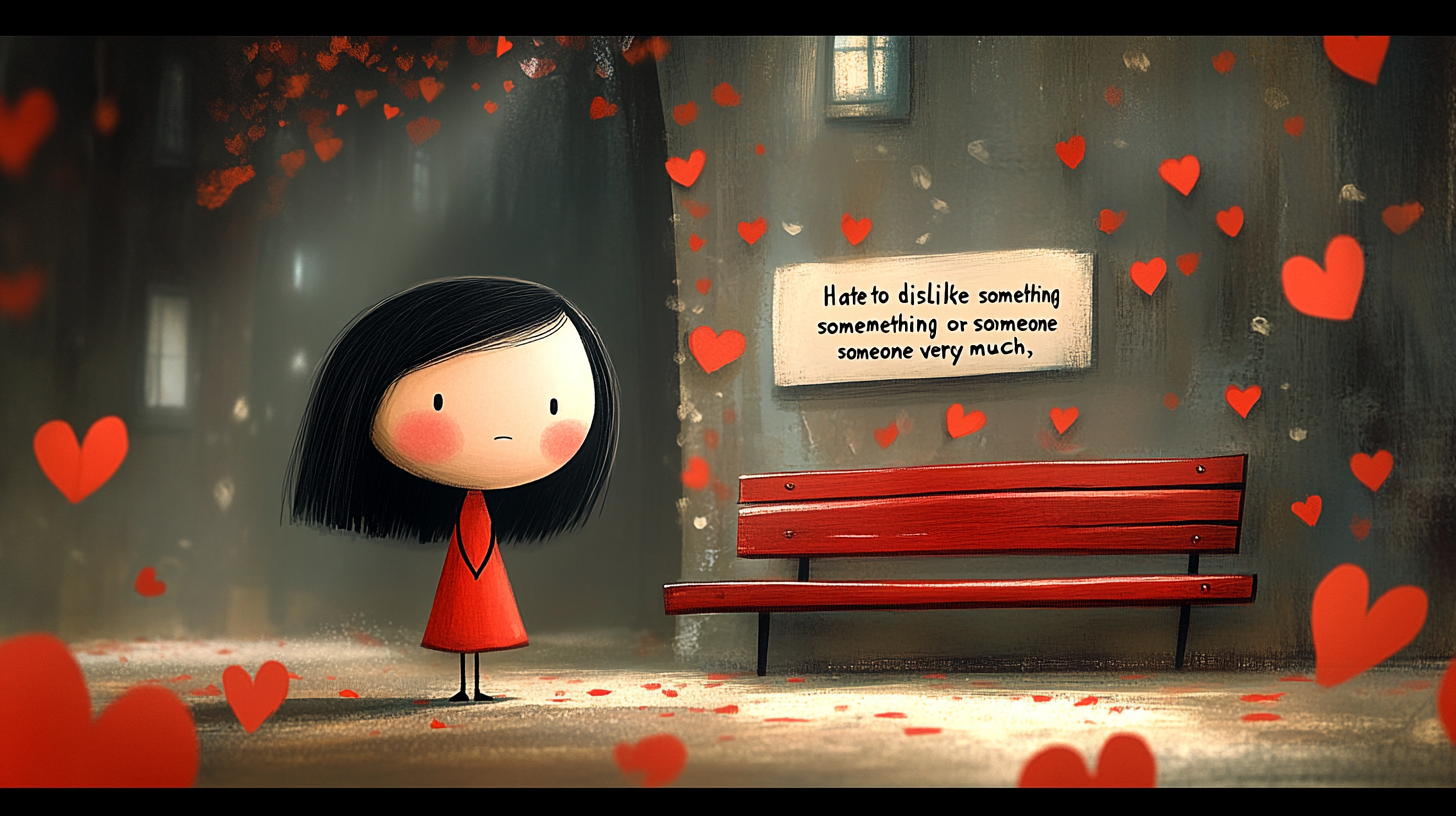“Hate” means “to dislike something or someone very much,” and it is used when you strongly dislike a person or thing.
以下は英単語 “hate” に関するストーリー型学習コンテンツです。まずは大枠の意味を理解して最後の文章で確認しましょう。
主な意味(main meaning)
| 品詞 | 意味 | 発音記号 | 英文例 |
|---|---|---|---|
| 動詞 | 激しく嫌う | /heɪt/ | I hate waking up early on Mondays. |
| 名詞 | 強い憎しみ | /heɪt/ | His heart was full of hate after the argument. |
語源(etymology)
「hate」は古英語の「hatan(憎む)」に由来し、「強く避けたい」「心から否定したい」という感情が核となっています。
類義語(synonyms)
| 類義語 | 英文例 |
|---|---|
| dislike | She dislikes crowded places. |
| detest | I detest lying to people. |
| loathe | He loathes doing laundry. |
| despise | They despise cheating in games. |
| abhor | She abhors violence of any kind. |
「hate」と「dislike」はどちらも「嫌う」という意味ですが、強さと感情の深さに違いがあります。
| 項目 | hate | dislike |
|---|---|---|
| 感情の強さ | 非常に強い | やや弱い、軽い |
| ニュアンス | 憎しみに近い強い拒絶感 | 単に好きではない、あまり好まない |
| 使用例 | 感情的・怒りを伴う場面 | 丁寧・控えめな表現 |
hate = 感情が強く、否定的な印象が強い
dislike = ソフトな表現で、丁寧に「好まない」と言いたいときに使う
反義語(antonyms)
| 反義語 | 英文例 |
|---|---|
| love | I love spending time with my family. |
| enjoy | He enjoys listening to music after work. |
コロケーション(collocations)
| コロケーション | 英文例 |
|---|---|
| hate doing something | I hate doing homework on weekends. |
| hate someone for something | She hated him for lying to her. |
| hate the idea of | I hate the idea of moving away. |
| grow to hate | Over time, he grew to hate his job. |
| hate with a passion | He hates math with a passion. |
2項表現(binomials)
| 2項表現 | 英文例 |
|---|---|
| love and hate | There’s a fine line between love and hate. |
| hit and hate | They had a hit-and-hate relationship in school. |
英語ストーリー(english story)
Title: A Job I Used to Hate
Ken used to hate his job. Every morning, he would wake up with a feeling of hate. He hated waking up early, hated taking the crowded train, and especially hated talking to his boss. Ken often said, “I hate this life.”
One day, his friend Yuki told him, “If you detest it that much, why not change?” Ken didn’t like the idea of starting over, but he grew to hate his current job so much that he began to think seriously.
He started looking for new opportunities. Yuki helped him write his resume. Soon, Ken got a new job at a small design company. At first, he disliked learning new tasks, but he enjoyed the friendly people and creative environment.
Ken realized that what he used to hate wasn’t work itself, but the environment. Over time, his hate turned into enjoyment. He even said to Yuki, “Now I love my job. I used to despise Mondays, but now I look forward to them!”
Ken’s story shows that hate can change. Sometimes, what we loathe can become something we enjoy—if we take action.
和訳
タイトル:かつて大きらいだった仕事
ケンは以前、自分の仕事が大きらいでした。毎朝、彼は嫌な気持ちで目を覚ましました。早起きも、混んだ電車も、特に上司と話すのが大きらいでした。ケンはよく「この生活がきらいだ」と言っていました。
ある日、友人のユキが言いました。「そんなに嫌いなら、変えてみたら?」ケンは最初、新しく始めるのが怖かったですが、今の仕事があまりにも嫌いになり、本気で考えるようになりました。
彼は転職先を探し始めました。ユキが履歴書作成を手伝ってくれました。やがて、彼は小さなデザイン会社で仕事を得ました。最初は新しい仕事に慣れず嫌でしたが、優しい人たちや創造的な職場を楽しめるようになりました。
ケンは、嫌いだったのは仕事そのものではなく、環境だったと気づきました。時間が経つにつれ、憎しみは楽しさに変わりました。彼はユキにこう言いました。「今は自分の仕事が好きだよ。前は月曜日が大きらいだったけど、今は楽しみなんだ!」
ケンの話は、「嫌い」も変わることを教えてくれます。ときには、嫌っていたことが、行動次第で楽しいものに変わるのです。



コメント